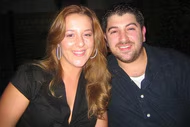How Did Ron Williamson Go From Hotshot Baseball Player To Accused Murderer?
Ron WIlliamson was sent to death row for the murder of Debra Sue Carter, as explored in Netflix's new docu-series "The Innocent Man."

Ron Williamson was initially famous in his small Oklahoma town for his promising baseball career, but he would soon become notorious for a more horrifying reason: He was convicted and sentenced to death in 1988 for the rape and murder of 21-year-old Debra Sue Carter.
[Warning: Spoilers for "Innocent Man" ahead]
Carter's killing and Williamson's conviction is the subject of Netflix's new series "The Innocent Man," based on the book of the same title by John Grisham. Understanding who Williamson was helps explain why he was pinned for the murder despite a lack of evidence.
His early life wasn't marked with the kind of warning signs you see in some killers' backgrounds. Ronald Keith Williamson was born in the small town of Ada, Oklahoma on Feb. 3, 1953, according to Grisham's book. His parents were Juanita, a very religious hospital worker, and Roy, a door-to-door salesman. Williamson's care often fell to his older sister, Annette, who did her best to spoil the child by sneaking him presents. His other sister, Renee, was his described as his playmate.
As the only son, Williamson had special status in the family, leading him to become a somewhat demanding kid, often asking for fancy clothes. He exhibited some moodiness, but nothing troubling. What stood out the most about little Ron was his prodigious talent for baseball.
With an arm "like a cannon" and a growing obsession with becoming the next Mickey Mantle, Williamson became a young star whose name first appeared in local newspapers praising his talents at just 9 years old. At 11, he led his team to undefeated success.
In school, Williamson was popular with the boys and especially so with the girls. He was elected the eighth grade class president. He devoured encyclopedias and memorized facts about presidential history. But despite his studious bookishness, he was quite needy.
"He could be self-absorbed, demanding, egocentric, downright childish — the obvious baby of the family — and then, with a burst of his outsized personality, he would have the entire family eating out of his hand," Grisham wrote.
As Williamson attracted the interest of a handful of baseball scouts, his parents moved to Asher, Oklahoma in the hopes of accommodating his burgeoning athletic career. There, Williamson was trained by esteemed coach Murl Bowen.
Williamson would go on to be picked 41st in the 1971 amateur draft and decided to hold off on college to pursue this dream, according to The Innocence Project. He performed well with the Coos Bay-North Bend A's, but his fame declined in following seasons until a shoulder injury took him out for two years.
He returned to the sport as a pitcher in the New York Yankees minor league system but was plagued by his injured shoulder, as noted by The New York Times. By the time he turned 24, it was clear to everyone around him that his career was over.
With the encouragement of a girlfriend, a former Miss Ada named Patty O'Brian, Williamson found somewhat steady employment as a salesman. The two were married in 1973 and the town still saw Williamson as "its biggest hero," according to Grisham. But it didn't last long. Williamson's mental health was clearly in decline.
Williamson held on to the belief that he would someday become a star, in a way Grisham characterized as "almost delusional." Williamson had also developed a drinking habit and a penchant for womanizing.
With the deterioration of his career and marriage, Ron's family began noticing something troubling.
"At times he was nervous, agitated, unable to concentrate or focus on one subject before ricocheting to the next," Grisham wrote. "At family gatherings, he would sit quietly, mute-like for a few minutes, then barge into the conversation with comments only about himself. When he spoke, he insisted on dominating the conversation, and every topic had to relate to his life. He had trouble sitting still, smoked furiously, and developed the odd habit of simply vanishing from a room."
What seemed like unfortunate personality quirks were exacerbated by drinking, drug use and the death of his father in 1978.
That same year, Williamson was accused of rape. In April, Lyza Lentzch claimed he forced her to have sex with him, but Williamson maintained the act was entirely consensual. He was found not guilty in court. Only a few months later, it happened again. Amy Dell Ferneyhough said that Williamson attacked and raped her behind a convenience store in September. Again, the accusations didn't stick: Williamson was found not guilty in court.
Humiliated and increasingly unable to function, Williamson lost his job and moved into his mother's house. He began sleeping upward of 20 hours a day. When he was awake, he started hearing voices.
Williamson resisted mental health treatment. He would be in and out of jail for crimes like drunk driving and spent brief periods in mental health facilities for the next few years, where he would receive a handful of different diagnoses: at various points he was considered everything from manic-depressive, to schizoid, to sociopathic, to dysthymic, to depressive, to schizophrenic.
He still claimed he was a professional baseball player and believed "they" would come and make him famous some day.
After the death of his mother, his condition worsened until he was essentially homeless, at one point living for free in an apartment with no running water. He was often seen wandering the streets aimlessly at night and could not bathe or clean himself.
Then the body of Debra Sue Carter was discovered on Dec. 8, 1982. The popular young cocktail waitress had been raped and strangled to death. Although it is unclear if Williamson was present at the bar where she worked and was last seen the night she was killed, police became convinced Williamson was guilty for lack of a better suspect. It would take years for them to gather enough evidence to finally charge him with the crime, and by then Ron was essentially non-functioning. During questioning, Williamson (who was not medicated at the time) semi-incoherently explained a dream he had about Carter, which was taken as a confession.
"OK, I had a dream about killing DEBBIE, was on her, had a cord around her neck, stabbed her, frequently pulled the rope tight around her neck," Williamson said during questioning, according to Grisham. "I am worried about what this will do to my family. My mother is dead now."
Despite the fact that Debra was not stabbed, the statement stuck. Williamson was ultimately convicted and sentenced to death. In his jail cell, he would often be heard screaming about his innocence.
Fortunately, that wasn't the end of Williamson's story. Aftter spending 11 years on death row, in 1999 DNA evidence exonerated him of the crime, and pointed authorities toward the true killer, Glen Gore, the last person Carter was seen alive with. Although Williamson died of cirrhosis soon after gaining his freedom back, he died with everyone knowing he was an innocent man.
[Photo: Netflix]


























